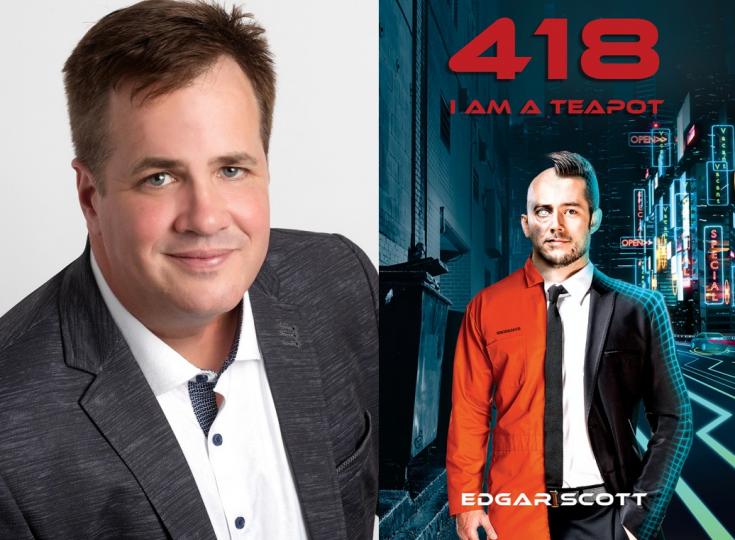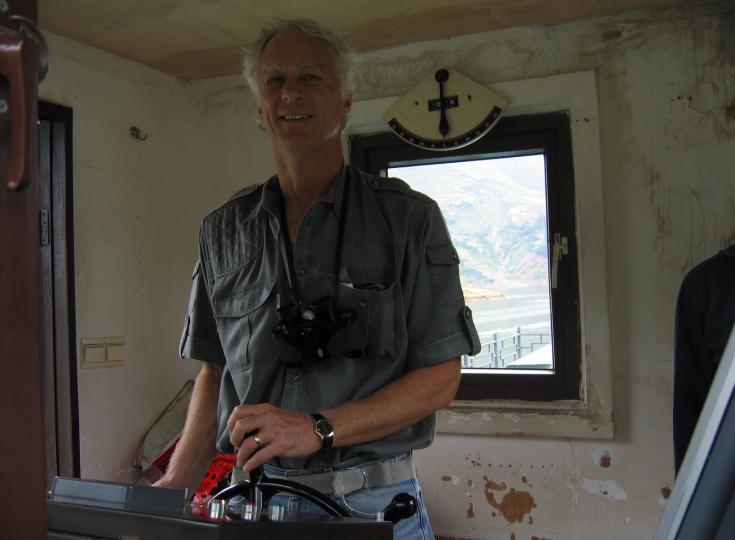Edgar Scott - Edge-Of-Your-Seat Near-Future Dystopian Sci-Fi

Edgar Scott is an economist-turned computer scientist. For over 20 years, Edgar served as a Senior Database Administrator and Development Operations Team Manager in financial, crypto-currency, and medical industries, as well as with start-ups. His experience has taught him that people’s limited beliefs often keep them prisoners in a life they don’t want to live. This theme resonates in his forthcoming dystopian novel, 418. Born in Houston, he grew up in Canada, and Scott now resides in South Florida with his wife where he explores the real cost of technology on humanity in the future.
Please give us a short introduction to what 418: I Am a Teapot is about.
The very short answer is that this is a story about re-humanization. There are a number of different storylines in this novel, one unifying storyline is about 418 and his discovery that everything in his online world is unreal and of no value. In order to find meaning in his life he must escape the economic class in which he has found himself, he then sets out on a journey to discover the world, rehumanize himself and escape the confines of his online world.
What inspired you to write a dystopian sci-fi novel?
For years I have worked behind the scenes in various tech companies. Often when people hear this, they talk about how cool they think technology is. I had a different point of view on it, I was there to fix it when it didn't work out. While I think that technology is super cool --it brings us a much-upgraded standard of living-- I wanted to present some of the drawbacks before we all lunge into the great unknown change that technology will bring. The story seemed evident to me; I had to take the time to describe the way that I saw technology can create a race to the bottom and an ever-decreasing standard of living for those who get caught in it.
In your story, people's brains exist in a virtual interface where they enjoy a fantasy world of endless indulgences. What fascinates you about this premise?
I find it interesting the notion that an experience is had without the need to physically experience it. We simply stimulate those parts of the brain and we see, hear, taste, feel whatever it is that was to be presented. This would be an internet that is connected to your nervous system. Personally, I find that chilling.
Tell us more about staff number 418. What makes him so special?
The thing that makes the staff known as 418, is that he asks questions that other staff do not ask; 418 does not simply accept the world as presented. It was the expectation of his manager that 418 would simply return to work after the unthinkable happens and he is injured. It intrigues his manager, Brian Agarwal, that 418 doesn't simply make idiotic noises and complaints, but he inquires. Asking questions and learning to ask better questions is fundamentally what thinking is, so 418 thinks and this is what separates him from the rest of staff.
Besides writing, what other secret skills do you have?
I enjoy financial analysis, I know that sounds dreadful, but it's great when you can take equity and make your own decisions on is this equity properly evaluated. I also enjoy coding with the Ruby programming language, I'd like to mechanize some of these financial analyses. Additionally, as a result of COVID, I've turned my garage into a gym, my attempt to win the unwinnable fight against the unstoppable march of time.
You are an economist-turned computer scientist. How has your work influenced your writing?
After four years of thinking about economics, how you see the world will change: I see economics and computers as complementary disciplines. It's my opinion that academic economics can be viewed as a study of systems. Computers, networks, databases, programming languages are practical implementations of systems. Both economic and computer systems follow their rules strictly, even if we don't understand those rules. This background plays out in the subtext of the dissolution of the working class through the implementation of technology which ironically makes labor very cheap. Labor becomes the dominant input in the macro-economic production function causing technological development to stall. I think it's fair to say that both fields have had an impact on my writing, certainly for this novel.
Do you have a set of rules for your world? Is there a process you go through that helps define these?
In order to keep the actions of my characters coherent, I liked to keep in mind the old economic adage, "everyone acts in accordance with what they perceive as their own self-interest." My characters do what is best for themselves as they see it, given the information that they have. I was always looking for the simplest motivation, I'm inspired by something that was evident to me as a DevOps manager, simply scales well. I've tried to keep their motivations simple in order to keep their actions justifiable.
There are other arbitrary rules in the world, but I think they are evident. There is a virtually unpaid working class, that is a fact that none of my characters dispute or seek to change. Law and judgment are arbitrary, authority figures are also arbitrary, as they often are or appear to be in our world. The world has become a very insular place, this is also not challenged until the characters decide to work together. There is no help from the government or social organizations, everyone is on their own or at best, their family group.
Your novel raises the question of whether technology will save us or destroy us. Which do you believe?
I don't believe either. We are always looking for a better, more efficient, way to do everything; technology will not stop evolving. What will save or destroy us is our attitude to change and the decisions that we make.
In 418 we have created the commodity of programmable labor, cheaper than machinery, so it has replaced machinery. In order to make this palatable we created an us versus them situation and dehumanized staff; symbolized by use of impersonal pronouns, staff are its. It was this attitude that some people could be dehumanized and choice to use this technology that created the stagnant society in this dystopia.
In our world, we often find that technology makes us more impersonal, if we choose to embrace this, we may find ourselves on the path to becoming staff and living in 418's world.
Which of your characters was the most challenging to create?
Brain Agarwal was the trickiest because he knows the most about this society. Brian is complicit, he knows better, but he cannot see "how" to fix his situation, so he takes no action. I enjoy the fact that he is like a lot of managers who know their employees are underpaid, overworked or mistreated; I have been often shocked to find out how little some of my teammates got paid. Ultimately, Brian has to understand that he and 418 are on the same level and share the same problems. His has no hope of freedom if he does not learn from and help 418.
What did you have the most fun with when writing 418: I Am a Teapot?
This is a story of hope and re-humanization. I love that I set my characters free. About the actual writing, I love saying things that contradict things that we all believe or things that I've said previously. I love that the concierge often gives 418 incorrect or summary information which is wrong or of no use. Irony is a very savory dish, but you know, if you ask an internet search engine a very technical specific question, you often get a lot of incorrect answers as the search engine returns to you what it thinks is the popular answer for the question that you just asked. I enjoy when someone tells me that they get it and what it is.
Tell us more about the cover and how it came about.
The cover is an original Zucco! I printed off a copy of an early version and handed it to a friend of mine who I worked within one of my previous tech opportunities. Zucco loves speculative fiction but he's a visual artist, and so he created 418 from composite images. This is his impression of 418 standing in both worlds. I am very fortunate to have talented friends, I love what he has done! I gave him no direction other than told him to have fun.
I find it interesting to ask people who don't know the novel, which side is the online 418 and which side is the offline 418?
Do you have any interesting writing habits? What's an average writing day like for you?
I like to write early in the day or late at night, probably a hangover from my techy days. I can often get a lot of things done at five in the morning, but sometimes working late into the night is good too, the velvet cloak of nighttime is soothing and reassuring. Writing is always best when I don't try too hard, this is what editing is for. I try to empty my mind, forget the world, and simply write what I see.
When I write, I try to picture each chapter as its own class, I only worry about writing one chapter at a time. Once I have three to five chapters, I'll edit them, this keeps me coordinated as I move through the book. I try to be as simple as possible. Simple is scalable, if I didn't say that before.
What are you working on right now?
I'm working on a speculative thriller about someone seeking justice, sorry, I don't like talking about work in progress, the story may change on me; I want the story to be excellent, not constrained by the understanding that I have of it today. For example, 418 was supposed to be written entirely from the first person and I've done sneaky stuff with the narrator. I came to understand that Brian's story is just as important, this was not my first understanding.
Getting back to the question of what am I working on right now: I'll end with a question, could you embrace Nihilism in order to attain Justice?
Where can our readers discover more of your work or interact with you?
I am online at edgarscottwrites.com, follow me on Instagram and Facebook as edgarscottwrites.








